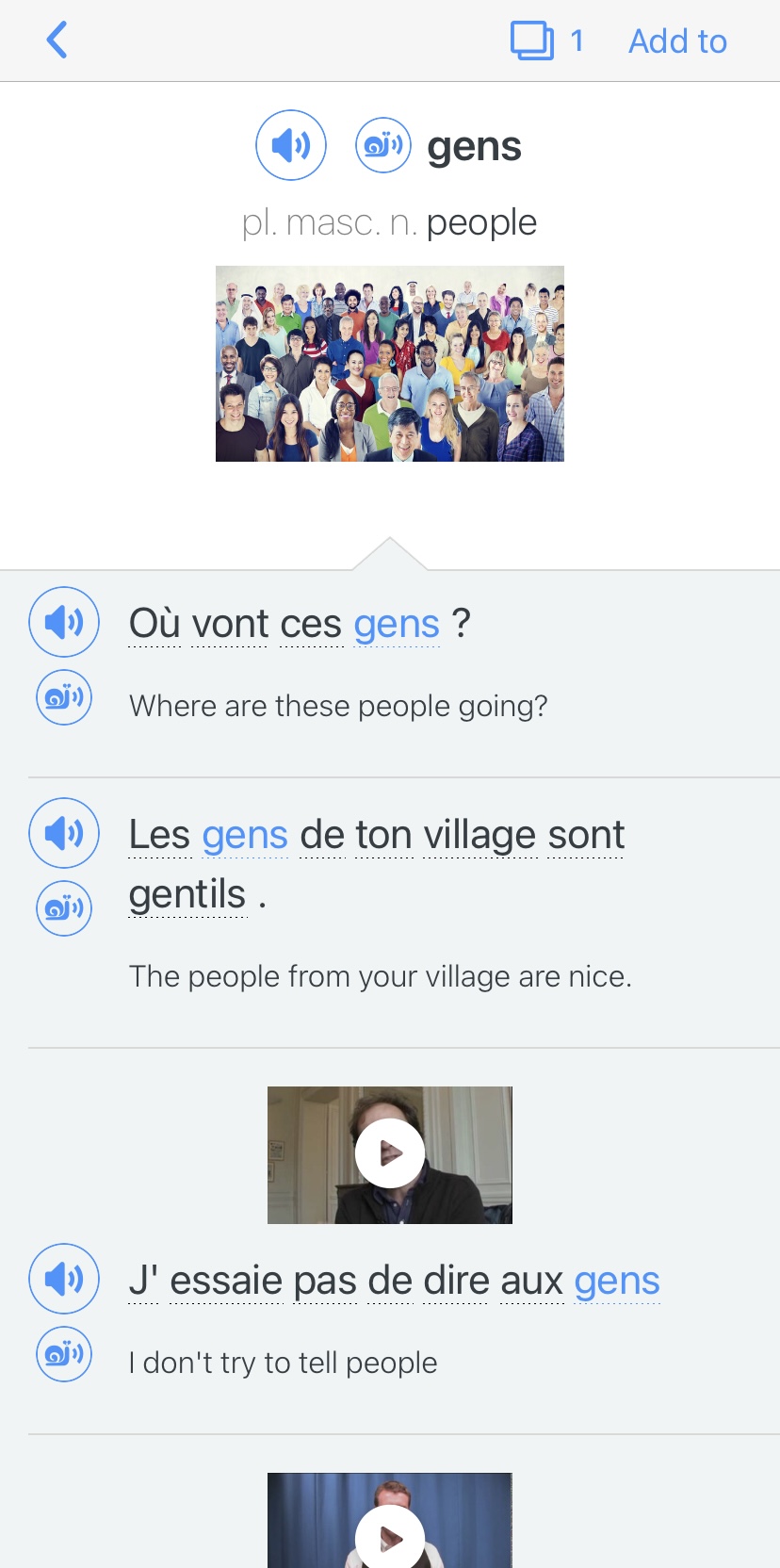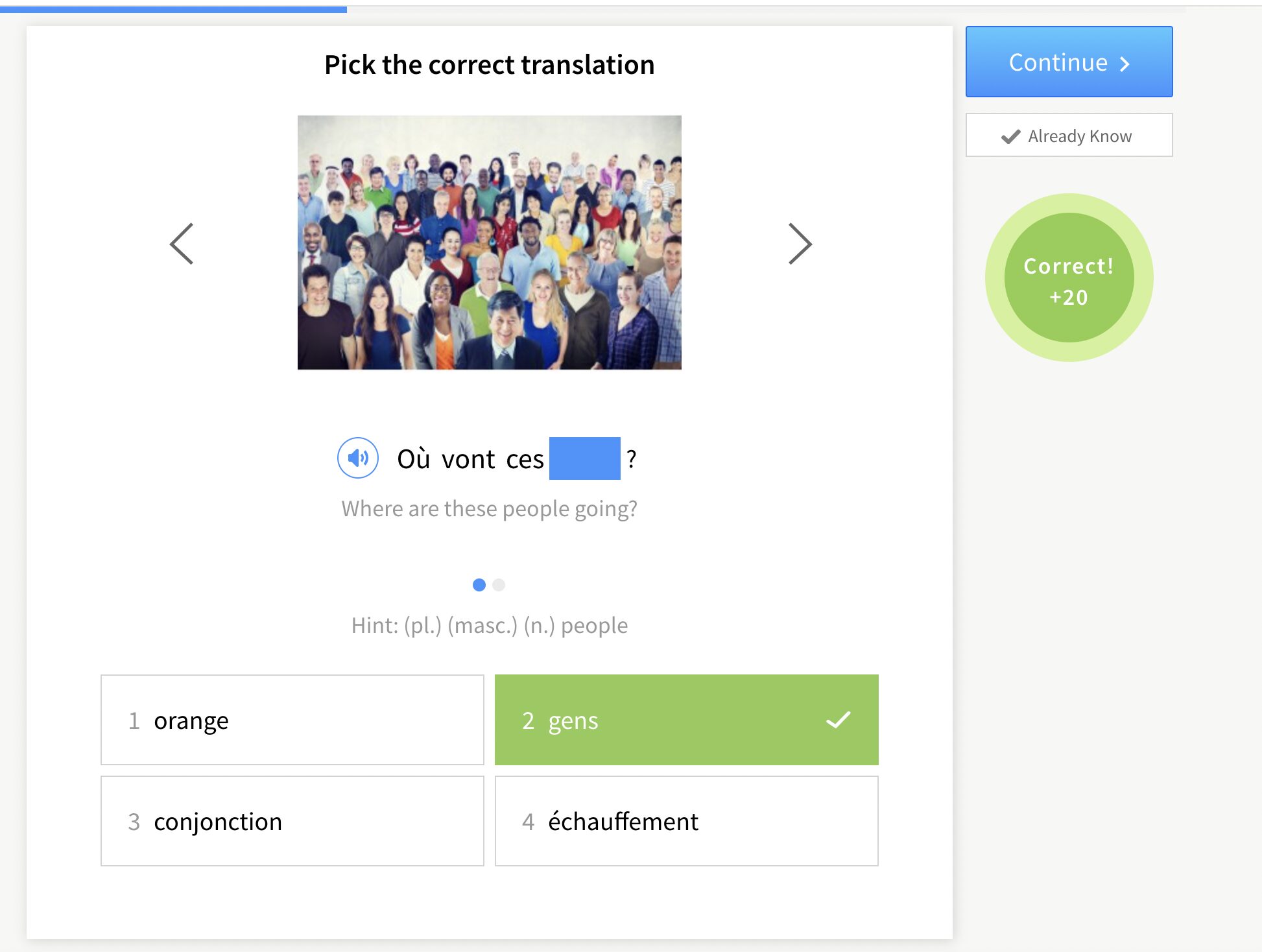8 Steps to Build French Learning Motivation

Motivation to learn French won’t come simply from reading inspirational quotes, you have to cultivate your own language learning motivation. You have to find a way to keep putting in those hours of practice that works for you.
Fortunately, that’s actually a lot easier to achieve than you might think. The eight steps below will help you study smarter, not harder, so that French practice becomes something rewarding that you actually want to do.
Download: This blog post is available as a convenient and portable PDF that you can take anywhere. Click here to get a copy. (Download)
You already know that French learning takes time and determination. In fact, L’Alliance Française (the French Alliance) recommends having 360 hours of French study to reach the intermediate level.
While that may not seem like a lot on paper, in practice, it’s quite an undertaking! That’s like working a full-time job for nine weeks as a language learner. No wonder it’s so easy to feel demotivated.
So, how do we escape the burn out and persevere? How do we stay motivated to learn French?
Check out these eight simple steps to find an endless source of language learning motivation again!
1. Set Realistic Goals for Your French Learning
So, you’ve heard the motivational expression “dream big,” right? Well, that’s actually not always the best way to motivate yourself.
While it’s fantastic to dream about French mastery and a day when you’ll be able to converse effortlessly in French, don’t let yourself plan to achieve too much and then get overwhelmed or disappointed. This happens when we set too many goals at once or try to tackle difficult topics too quickly.
The solution? Start off small.
Set one French learning goal at a time. Once you’ve accomplished that goal, you can set another. And another. And another. And then, wow, have you accomplished that many goals already?
Good goals follow a simple formula. They’re specific, measurable, attainable, relevant and time-bound—this is the S.M.A.R.T. method, a time management concept created by Peter Drucker.
For example, you could start with the goal to memorize all the present-tense conjugations of the verb être (to be) within one month. This goal is:
- Specific: It’s very concrete and has a clear end-point
- Measurable: You can easily test yourself before, during and after your studies to see how many of the conjugations you know
- Attainable: This is a realistic goal and it isn’t dependent on factors outside of your control
- Relevant: You definitely need to know these verb conjugations to communicate in French
- Time-bound: You’ve set yourself a deadline of one month
Your goals will shift over time. For example, what’s attainable and relevant later might not be attainable and relevant now.
If you slip on a goal, that’s completely okay. It’s time to evaluate why: did you give yourself too little time? Was the goal too intensive? Was the goal boring? Change it up if it’s not working for you!
2. Track Your Progress (and Reward Yourself)
In tandem with goal planning is goal tracking. While it’s all fine and dandy to have goals, documenting your progress makes them real and makes you more accountable to them.
Like goal setting, keeping track is easy! Simply get a notebook and write your weekly (or bi-weekly, or monthly) goals inside. As you complete them, check them or cross them off. One of the best parts about achieving a goal is getting to cross it off your list once you’re done!
Further, there’s nothing more satisfying than looking back at all the goals you’ve crossed off and seeing all you’ve accomplished. In fact, tracking the progress of your French goals will increase your motivation because, over time, it’ll demonstrate how much hard work and dedication you’ve invested in French and inspire you to continue!
This can be an especially helpful reminder if you’re currently stuck on a difficult French topic and need a little confidence boost.
Oh, wait: here’s the most important part to truly build your learning motivation. For every goal you track and complete: reward yourself. I suggest a French pastry. Or a good wine. Or baked brie and a baguette.
3. Study French in Spurts
Believe it or not, a big source of motivation comes from perseverance, not the other way around. The hardest part of any journey or undertaking is getting started—continuing it becomes easier and easier.
But how do you trick your brain into building this kind of stamina?
Don’t study French for hours on end. This will only lead to fatigue and boredom. Instead, I recommend learning French in spurts. Perhaps start with a few short sessions until you build up stamina.
In fact, I’d advocate incorporating French into every single day. While it may not work out that way (we all need a “cheat day” every once in a while), 20 minutes a day is better than a three-hour study session every two weeks. Besides, you can always add more time if you want to, but I recommend taking small breaks between 40-minute study chunks to give your mind some rest and the chance to digest the information.
Inconsistency spells failure for any type of learning. Frankly, it’s impossible to learn a language by doing a single French study session per month. Even once a week may be too little. You’ll spend more time reviewing and relearning than actually learning new material, which will only disappoint and demotivate you.
4. Turn Dead Time into French Time
Now I bet you’re thinking, “what if I don’t have time to study French that often?”
I don’t mean to be rude, but not having time isn’t an excuse. In fact, I’d argue that you do have time, French learner, no matter how busy your schedule is. You need to make use of what’s called “dead time!”
No, this isn’t some sort of horror movie-style way to learn a language. Dead time includes all those minutes during your commute in public transit, sitting in waiting rooms or eating alone—where you’re technically occupied, but still able to do a small, quiet task.
Transforming your dead time into French time won’t just help you squeeze in more language practice. It’ll also teach you how easy it is to prioritize your French learning, and you’ll see that becoming a French master doesn’t take hours and hours of nonstop studying. This is great for your motivation to learn French because fluency will feel so much more within reach.
5. Remember French Grammar Hacks
One of the biggest downers when learning French is the grammar. At times, it can be complicated, and it may even seem that for every French rule there are at least a million exceptions.
Okay, I’m exaggerating, but it can definitely be trying.
Instead of letting French grammar bog you down, however, boost your spirits (and your knowledge) with these handy hacks.
- French gender can seem completely random. How are you supposed to know that a table is feminine (une table) but a book is masculine (un livre)? Luckily, you can often predict a noun’s gender by its ending using the patterns laid out in this article.
While this isn’t possible 100% of the time, this trick does make it easier to navigate gender in the French language.
- According to Ethnologue, as much as 27% of the French language is identical or nearly identical in spelling to English because the languages have a high lexical similarity. That percentage may not seem like a lot, but compare that to a language like Arabic or Mandarin that has virtually no lexical similarity with English, and 27% is a huge asset!
- Pronouncing different verb forms is often way easier than spelling them. For example, the regular present tense endings for -er verbs are all pronounced the same for the je, tu, il, elle, on, ils and elles forms, even though their endings are spelled differently.
The regular present tense endings for -ir verbs are all pronounced the same for the je, tu, il, elle and on forms, even though their endings are spelled differently as well.
Here are several more simple French learning hacks to supercharge your studies.
6. Learn What You Love
The easiest way to build your motivation to learn French is using study materials you actually care about.
And the easiest way to do that is to take what you like to do in your everyday life, and make it French.
Do you like to watch YouTube videos? Subscribe to the funniest French YouTubers’ channels. You can also head over to our channel, which is filled with video lessons based on French-language media:
For a little extra learning support, you could also use a video-based learning platform like FluentU.
FluentU takes authentic videos—like music videos, movie trailers, news and inspiring talks—and turns them into personalized language learning lessons.
You can try FluentU for free for 2 weeks. Check out the website or download the iOS app or Android app.
P.S. Click here to take advantage of our current sale! (Expires at the end of this month.)
And how about podcasts? Download some fascinating podcasts in French. If you like reading, try curling up with French books or scrolling through some French blogs.
And guess what? If you don’t like classes or textbooks, you don’t have to use these as learning methods to master French.
You’re welcome!
7. Make a French Friend
Speaking French with others in and of itself is great motivation to keep improving and keep learning. In fact, there’s no better feeling than holding your own in a real French conversation.
“But I’m not an advanced French speaker yet!” you protest. “How can I converse with French speakers?”
Contrary to popular belief, you don’t need to be proficient in French to talk with native speakers. You should start speaking from the get-go! In the beginning it’ll be just the basics (My name is… I live in…) but pulling these conversations out of the textbook and into real life with native speakers makes them so much more memorable and meaningful.
So now, the big question: how do you make French friends?
The easiest way to meet a native French speaker and practice with them on a weekly basis is by using a language exchange tool like iTalki or Tandem. Simply sign up and message a native speaker who looks friendly, has the same interests as you and is studying your native language. It’s polite to spend half the time speaking in your native language and half in French.
If you prefer in-person conversations, join a French club in your city to meet other French speakers and learners! This can be done on websites such as Meetup, where weekly French conversation hours can be found in your city or in places nearby.
8. Take a Trip Somewhere French
It’s time to reap the rewards of your French fluency by speaking French “in the wild!”
The most obvious recommendation is to take a trip to a French-speaking country or region. For example, you can travel to Quebec or France or a nation in the Caribbean or Africa. Better yet, enroll in a course and learn French in a city like Lyon.
What if you can’t afford to travel far, though? Another easy solution: find a French bakery or restaurant in your city and practice your French there.
Trust me, the results will inspire and motivate you to continue!
Don’t wait for your motivation to learn French to magically appear. Just follow the simple steps above to build it yourself!
Download: This blog post is available as a convenient and portable PDF that you can take anywhere. Click here to get a copy. (Download)
And One More Thing…
If you’re like me and prefer learning French on your own time, from the comfort of your smart device, I’ve got something you’ll love.
With FluentU’s Chrome Extension, you can turn any YouTube or Netflix video with subtitles into an interactive language lesson. That means you can learn French from real-world content, just as native speakers actually use it.
You can even import your favorite YouTube videos into your FluentU account. If you’re not sure where to start, check out our curated library of videos that are handpicked for beginners and intermediate learners, as you can see here:
FluentU brings native French videos within reach. With interactive captions, you can hover over any word to see its meaning along with an image, audio pronunciation, and grammatical information.
Click on a word to see example sentences and other videos where it's used in different contexts, then add it to your flashcards. For example, if I tap on the word "gens," this is what pops up:
Want to make sure you remember what you've learned? We’ve got you covered. Each video comes with exercises to review and reinforce key vocab. You’ll get extra practice with tricky words and be reminded when it’s time to review so nothing slips through the cracks.
The best part? FluentU tracks everything you’re learning and uses that to create a personalized experience just for you. Start using the FluentU website on your computer or tablet or, better yet, download our app from the App Store or Google Play.
Click here to take advantage of our current sale! (Expires at the end of this month.)














